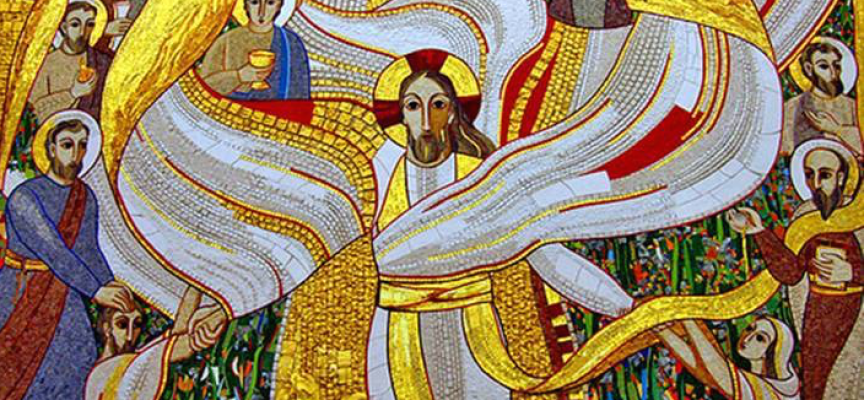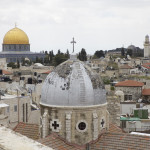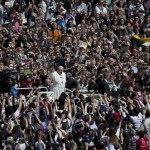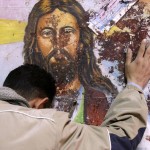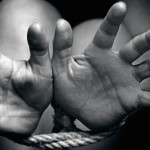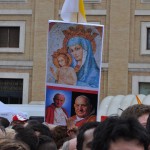If the means of communication we have today had existed at the time of Christ, here is the news that you could have heard during the Holy Week:
“Jerusalem – the death sentence of one Jesus of Nazareth has provoked strong emotions in people. Judged by the Sanhedrin and then by the authorities of Roman occupation, he was sentenced to death and crucified with two thieves. And that’s because he had presented himself as the Son of God and King.
Some observers have noted that his entry into Jerusalem had caused great agitation. Many people had crowded together to his passage to cheer him. These are however the same crowds who demanded his death.
It is said in well-informed environments that Jesus was betrayed by one close to him. One thing is certain in any case: you will hear about Jesus of Nazareth again and again; he already has many followers”.
In those days no radio, no television and no news agency. But there were witnesses. And thanks to them, more than 2000 years after the death and resurrection of Christ, many millions of men, women, children, have worldwide founded their hope on him and found in him the strength to love and forgive.
This is what Pope Francis wants to celebrate summoning a Year of Mercy. It will begin on December 8th, 2015, and end on November 20th, 2016. In this way he wanted to hit like a punch to put Christians in the face of the madness of faith, of love and forgiveness.
For those who are not familiar with the religious vocabulary we’ll specify that the term “mercy” means the goodness of God who forgives the sins of men in order to restore them to their human dignity. Men are also encouraged themselves to practice mercy, for this they need the mercy of God to become merciful in their turn.
Mercy is a theme particularly dear to Pope Francis. “The whole Church, the Pope says, will find in this Jubilee the joy of finding God’s mercy and make it fruitful; with it we are all called to give comfort to every man and woman of our time”.
When next December Pope Francis will make the symbolic gesture of opening the door of the Holy Year, he will invite the Christians, strengthened by their reconciliation with God, but also all men of good will, to be open to an extraordinary movement of brotherhood passing through the need for conversion and reconciliation.
Then, in this world shocked, in societies injured and divided, the Church shows itself, with the wounds of his own weaknesses, as a sign of love. It would like to remind humanity that its vocation is to live reconciliation and forgiveness and to find strength in the love and mercy of God.
This year will have to be lived only with demanding revisions of one’s own life, in which everyone can measure the part that we occupy in the disorder of the world.
Si les moyens d’information qui sont les nôtres aujourd’hui avaient existé au temps du Christ, voici la dépêche que vous auriez pu entendre au cours de la Semaine sainte:
« Jérusalem — La condamnation à mort d’un certain Jésus de Nazareth a causé une très vive émotion dans la population. Jugé par le sanhédrin, puis par l’autorité d’occupation romaine, il a été condamné à mort et crucifié avec deux voleurs. Et c’est parce qu’il se présentait comme Fils de Dieu et Roi.
Des observateurs ont noté que son entrée à Jérusalem avait fait grand bruit. Nombreux étaient ceux qui se pressaient sur son passage pour l’acclamer. Ce sont cependant les mêmes foules qui ont réclamé sa mort.
On dit, dans les milieux bien informés, que Jésus a été trahi par l’un de ses proches. Une chose est en tout cas certaine, on entendra parler et reparler de Jésus de Nazareth qui compte déjà de nombreux disciples. »
En ce temps-là, ni radio, ni télévision, et pas d’agence de presse. Mais il y avait des témoins. Et grâce à eux, plus de 2000 ans après la mort et la résurrection du Christ, plusieurs millions d’hommes, de femmes, d’enfants, à travers le monde, ont fondé sur lui leur espérance et puiser la force d’aimer et de pardonner.
C’est cela que veut célébrer le pape François en annonçant la convocation d’une Année de la Miséricorde. Elle commencera le 8 décembre 2015, et s’achèvera le 20 novembre 2016. Faisant cela il a voulu frapper comme un grand coup pour remettre les chrétiens face à la folie de la foi, de l’amour et du pardon.
Pour ceux qui ne sont pas des familiers du vocabulaire religieux précisons que le terme « miséricorde » désigne la bonté de Dieu qui pardonne les fautes humaines afin de rétablir les hommes dans leur dignité. Les hommes sont eux aussi invités à pratiquer la miséricorde, pour cela ils ont besoin de la miséricorde de Dieu afin de devenir à leur tour miséricordieux.
La miséricorde est un thème particulièrement cher au pape François. « Toute l’Église, dit le pape, pourra trouver dans ce jubilé la joie de retrouver et de rendre féconde la miséricorde de Dieu avec laquelle nous sommes tous appelés à donner la consolation à chaque homme et à chaque femme de notre temps. »
Lorsqu’il accomplira en décembre prochain le geste symbolique d’ouverture de la porte de l’Année sainte, le pape François invitera les chrétiens, fortifiés par leur réconciliation avec Dieu, mais aussi tous les hommes de bonne volonté, à s’ouvrir à un extraordinaire mouvement de fraternité qui passe par les exigences de la conversion et de la réconciliation.
Alors, dans ce monde écorché, dans des sociétés meurtries, divisées, l’Église se présente avec les blessures de ses propres faiblesses comme signe d’amour. Elle voudrait rappeler à l’humanité que sa vocation c’est de vivre la réconciliation et le pardon et d’en puiser la force dans l’amour et la miséricorde de Dieu.
Cette année ne pourra se vivre que dans d’exigeantes révisions de vie individuelles, au cours desquelles chacun pourra mesurer la part qu’il prend lui aussi au désordre du monde.
Pasqua: il Risorto e il disordine del mondo
Se i mezzi di comunicazione che abbiamo oggi fossero esistiti al tempo di Cristo, ecco la notizia che avreste potuto sentire durante la Settimana Santa:
“Gerusalemme – La condanna a morte di un certo Gesù di Nazareth ha provocato una forte emozione nella gente. Giudicato dal Sinedrio e poi dall’autorità di occupazione romana, è stato condannato a morte e crocifisso con due ladri. E questo perché si era presentato come Figlio di Dio e Re.
Alcuni osservatori hanno notato che il suo ingresso in Gerusalemme aveva procurato grande agitazione. Molte persone si erano affollate al suo passaggio per acclamarlo. Queste sono comunque le stesse folle che hanno reclamato la sua morte.
Si dice in ambienti ben informati che Gesù è stato tradito da uno a lui vicino. Una cosa è certa: in ogni caso, si sentirà parlare e riparlare di Gesù di Nazareth, che conta già molti seguaci”.
In quei tempi niente radio, niente televisione e nessuna agenzia di notizie. Ma c’erano testimoni. E grazie a loro, più di 2000 anni dopo la morte e risurrezione di Cristo, molti milioni di uomini, donne, bambini, in tutto il mondo, hanno fondato su di lui la loro speranza e trovato in lui la forza di amare e perdonare.
Questo è ciò che papa Francesco vuole celebrare annunciando la convocazione di un Anno di Misericordia. Avrà inizio l’8 dicembre 2015 e si concluderà il 20 novembre 2016. In tal modo ha voluto colpire come con un pugno per rimettere i cristiani davanti alla follia della fede, dell’amore e del perdono.
Per coloro che non hanno familiarità con il vocabolario religioso precisiamo che il termine “misericordia” indica la bontà di Dio che perdona i peccati umani per ristabilire gli uomini nella loro dignità. Gli uomini sono anche loro incoraggiati a praticare la misericordia, per questo hanno bisogno della misericordia di Dio per diventare a loro volta misericordiosi.
La misericordia è un tema particolarmente caro a papa Francesco. “Tutta la Chiesa, dice il Papa, potrà trovare in questo giubileo la gioia di ritrovare e rendere feconda la misericordia di Dio, con la quale tutti noi siamo chiamati a dare conforto a ogni uomo e donna del nostro tempo”.
Quando il prossimo dicembre compirà il gesto simbolico dell’apertura della porta dell’Anno Santo, papa Francesco inviterà i cristiani, rafforzati dalla loro riconciliazione con Dio, ma anche tutti gli uomini di buona volontà, ad aprirsi a uno straordinario movimento di fraternità che passa attraverso l’esigenza di conversione e di riconciliazione.
Allora, in questo mondo sconvolto, nelle società ferite, divise, la Chiesa si presenta, con le ferite delle proprie debolezze, come segno di amore. Essa vorrebbe ricordare all’umanità che la sua vocazione è quella di vivere la riconciliazione e il perdono e di attingere la forza nell’amore e nella misericordia di Dio.
Quest’anno non si potrà vivere se non con esigenti revisioni della propria vita, dentro le quali ognuno potrà misurare la parte che anche noi occupiamo nel disordine del mondo.
Mgr. Jean-Michel di Falco Léandri
Évêque de Gap et d’Embrun (France)
Latest posts by Mgr. Jean-Michel di Falco Léandri (see all)
- The dust of Europe and the dust of Africa - 20 febbraio 2016
- The drama becomes a spectacle - 30 aprile 2015
- Easter: the Risen and disorder in the world - 4 aprile 2015

